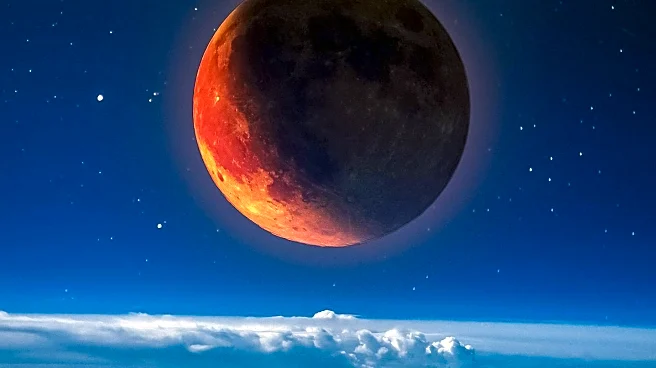What is the story about?
What's Happening?
A total lunar eclipse, known as the 'Blood Moon' due to its reddish hue, is set to occur on the night of September 7 and 8, 2025. This event marks the second and final total lunar eclipse of the year, lasting over five hours with 82 minutes of full totality. The eclipse will be visible in regions including India, China, Russia, western Australia, eastern Africa, and much of central Asia. The western Pacific, Indian Ocean, Antarctica, and parts of eastern Africa are also prime viewing locations. Unfortunately, North America will miss the event as the moon will have already set, though the western tip of Alaska might catch a partial phase. In the UK and western Europe, viewers may see part of the totality as the moon rises. The eclipse will be broadcast online by the Virtual Telescope Project in Italy, starting just after 5:45 pm UTC.
Why It's Important?
The 'Blood Moon' is a significant astronomical event that draws interest from both amateur and professional astronomers worldwide. It provides an opportunity for educational outreach and public engagement in astronomy. The visibility of the eclipse across multiple continents highlights the interconnectedness of global astronomical phenomena. For regions able to view the eclipse, it offers a chance to observe celestial mechanics in action without the need for special equipment. The event also underscores the importance of international collaboration in astronomy, as organizations like the Virtual Telescope Project facilitate global access to such phenomena.
What's Next?
As the eclipse approaches, astronomers and enthusiasts are preparing for observation and documentation. The Virtual Telescope Project's live stream will allow global audiences to experience the event, fostering international interest in astronomy. Local observatories and educational institutions may host viewing events, promoting community engagement and scientific literacy. The eclipse may also inspire future astronomical research and exploration, as scientists analyze data collected during the event.
Beyond the Headlines
The 'Blood Moon' phenomenon can spark discussions about the cultural and historical significance of lunar eclipses. Throughout history, such events have been interpreted in various ways, often influencing folklore and mythology. In modern times, they serve as reminders of the natural world's beauty and complexity, encouraging reflection on humanity's place in the universe.
















